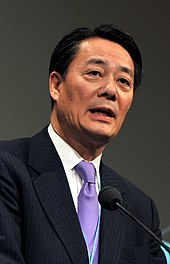Banri Kaieda
Banri Kaieda (jap. 海江田 万里, Kaieda Banri; born 26. February 1949 in Suginami, Tokyo Prefecture) is a Japanese politician (Zeikintō→New Japan Party→Minshu Shintō Club→Shimin League→Democratic Party→Democratic Progressive Party→Constitutional Democratic Party) and a member of the Lower House of the National Diet, for Tokyo Prefecture (constituency 1 or proportional representation bloc) since 1993 with interruptions (2005-2009, 2014-2017). He served as Minister of State for Economic, Fiscal, Science and Technology Policy in the first-ever Kan Cabinet reshuffle from 2010 to 2011, Minister of Economy in the second-ever Kan Cabinet reshuffle from January to September 2011, and Chairman of the Democratic Party from 2012 to 2014.
A 1972 graduate of Keiō University as a political scientist, Kaieda worked as a secretary to an upper house deputy and as an economic commentator for newspapers, magazines, and television after graduation. In the 1986 Upper House election, he ran for the Zeikin-tō ("Tax Party") in Tokyo Prefecture but was not elected. In 1993, he ran for the New Japan Party in the old three-mandate 1st Tokyo constituency for the Lower House and was elected from the floor with the highest percentage of votes. Unlike most party members, he did not participate in the formation of the New Progressive Party in 1994, and in 1995 became party chairman of the Shimin League ("Citizens League"), which he co-founded with Sadao Yamahana (formerly SPJ) and other ex-socialists. In 1996 the Shimin League became part of the Democratic Party.
Since 1996, Kaieda has run in the new single-member Tokyo 1 constituency, which he lost to Kaoru Yosano (LDP) in 1996 and 2005. In 1996, however, he succeeded in election via the Democratic Party's Tokyo proportional ticket. In the Shūgiin, he served as a member of the Budget and Finance Committees, among others, and as committee chairman several times between 2010 and 2012. In the DPJ, he was chairman of the Tokyo Prefectural Association in 2000 and chairman of the Political Research Council in 2002.
In September 2010, Prime Minister Naoto Kan appointed him to his cabinet as Minister of State for Economic, Fiscal, Science and Technology Policy; in a cabinet reshuffle in January 2011, he took over the Ministry of Economy, Trade and Industry, which he headed until September 2, 2011. Following Kan's resignation in 2011, Kaieda ran to succeed him in the election for party leader; he led in the first round, but was defeated in the runoff by Yoshihiko Noda.
In the 2012 lower house election, which ended in landslide losses for the Democrats nationwide, Kaieda lost the Tokyo 1 constituency by 1,134 votes to Liberal Democrat Miki Yamada, but topped the Democratic proportional ticket in Tokyo with this narrow defeat and was re-elected in the proportional block. After the election, he ran again for the party chairmanship, defeating Sumio Mabuchi. Under his leadership, the Democrats lost their position as the strongest party in the Upper House after six years to the Liberal Democrats in the 2013 Upper House election. In the 2014 Lower House election, Democratic candidates nationwide recovered slightly from the 2012 landslide defeat, but Kaieda himself was defeated by Miki Yamada by an even larger margin (Kaieda 35.6%, Yamada 42.7%), also missing out on a seat in the Tokyo proportional representation bloc. After being voted out of the lower house, Kaieda resigned from the party chairmanship. In the 2017 Lower House election, he ran again in the Tokyo 1 constituency for the Constitutional Democratic Party, founded shortly before by Yukio Edano, and this time narrowly won against Yamada (Kaieda 40.7%, Yamada 39.4%).

Banri Kaieda (2011)
Search within the encyclopedia